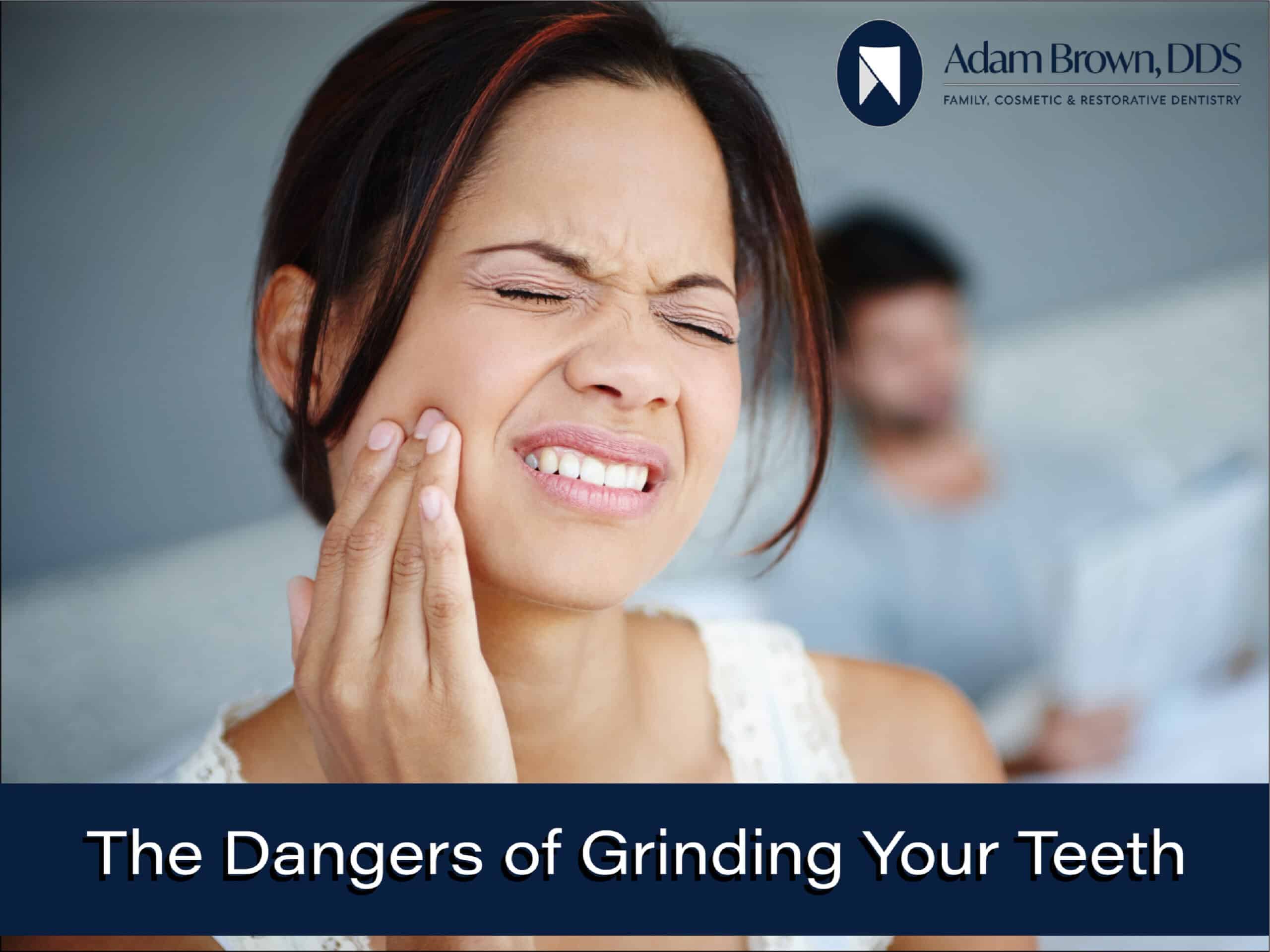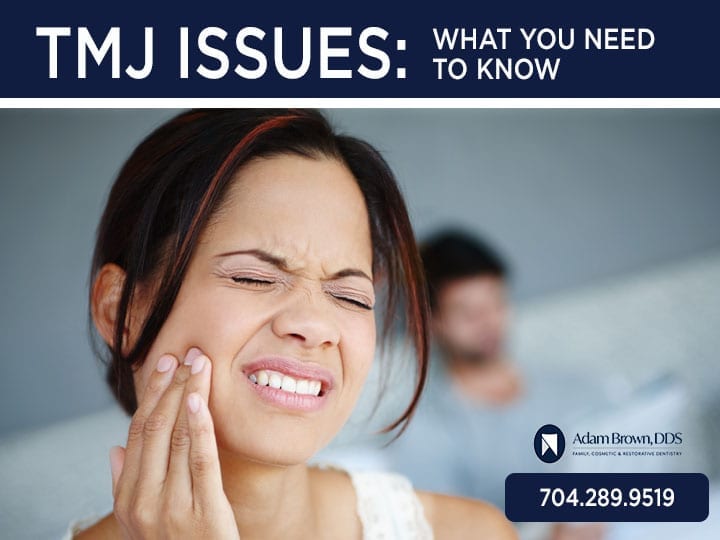The Dangers of Grinding Your Teeth

Do you ever wake up in the morning with a slight headache and a stiff or sore jaw? If so, these symptoms could be the result of grinding your teeth during sleep. Teeth grinding is a common problem with a myriad of causes, and if you think you may be grinding away on those teeth every night, Adam Brown DDS can help you to stop.
Grinding of the teeth and clenching of the jaw—known as “Bruxism” in the dentistry world—usually happens unconsciously while you are asleep or awake, and it can lead to all sorts of sleeping disorders such as snoring, even sleep apnea.
How do you know if you are grinding your teeth at night? Here are a few signs that could indicate bruxism:
1. Flattened teeth.
2. Loose, chipped, or cracked teeth.
3. Tight or sore jaw muscles, especially when you wake from sleep.
4. Regular toothaches and/or increased sensitivity.
5. A dull ache surrounding your ears and temples.
6. Temporomandibular joint pain (TMJ), which is clicking or grinding when you move your jaw.
Though having any of these signs could mean you are grinding your teeth, but the best way to be sure is to pop in for a visit. A trained eye can see the side effects of teeth grinding pretty quickly and diagnose the issue and begin working towards a solution.
Why Do We Grind Our Teeth?
Truthfully, we are not entirely sure what causes bruxism. Whether physical, psychological, even genetic, there are a host of reasons people might grind their teeth while sleeping. Often when people are under a lot of stress and anxiety, they begin to subconsciously bite abnormally or aggressively, which can then lead to bruxism. Teeth grinding can also be a side effect of some medications like antidepressants.
If you think or know, you are grinding your teeth at night, begin narrowing down the possible reasons: does your family have a history of teeth grinders? Are you on medication? Are you under more stress than usual?
Getting Help
Rather than trying to live with bruxism until your teeth are whittled down to nothing, consider visiting us at Adam Brown DDS. Even if you are unsure if you are suffering from bruxism, it’s worth a quick appointment to find out and get help if needed. During your dental exam, we will look for any excessive wear on your teeth, any cracks or chips, even loose teeth.
Depending on what we find, we will then discuss a plan to stop you from grinding those teeth every night. Here are some possible solutions:
• Wearing a Mandibular Advancement Device. This is a method for the more serious grinders where a mouthpiece is attached to your head that keeps your jaw fixed in one position. It’s not the most comfortable solution, but it works!
• Wearing a basic mouth guard to protect the teeth while asleep. The mouth guard is perfectly molded to your teeth, and though this is a bit uncomfortable in the beginning, you will quickly get used to it.
• Wearing a splint that keeps the teeth separated. If the mouth guard is too bulky or awkward, consider the low-profile splint instead.
• Abstain from alcohol for a while. It has been proven that drinking alcohol does, at times, intensify bruxism while sleeping.
• Cut back, or cut out completely, anything with caffeine in it. The energy gained from caffeine can cause nerves and muscles to work overtime while sleeping.
• Begin using stress-management techniques. Maybe even begin some behavioral therapy, such as training yourself to hold your jaw and mouth in a single position for long periods of time.
The good news is that teeth grinding is treatable. If you suffer from bruxism, we will find a way to stop it. This is why it’s so important to visit your dentist as soon as you suspect you are grinding your teeth at night. We can assess and apply the appropriate method of treatment, and make any adjustments along the way. The key thing to note is the sooner you get treatment, the healthier your teeth and mouth will be—and remain to be.
Healthy Teeth, Happy Living
While we are on the subject of maintaining those teeth, let’s not forget the basics when it comes to keeping them clean and healthy. In order to maintain a pleasant smile, it’s important to set a regime of brushing twice a day. Brush your teeth in the morning and at night with fluoride toothpaste. In the morning it’s a good idea, to begin with, mouth wash, which breaks down plaque and food particles. Then thoroughly floss between each tooth to get those spots your toothbrush won’t reach. When brushing, hold the toothbrush at an angle pointing the bristles towards the gums. Brush, using back-and-forth motions on both the inside and outside of the teeth, making sure not to scrub too vigorously.
Brushing too hard can cause the gums to recede and expose sensitive areas of the teeth. It is strongly advised to use a soft-bristled toothbrush. Brush for two minutes a side and repeat the same process at night. People tend to see the dentist once a year, but it’s much better for you if you go every six months. Here are four reasons why:
1. Removing Hardened Plaque. You know when you visit the dentist and he gets that sharp, silver hook tool and scrapes it against your teeth? Sometimes, he has to press extra hard and poke and prod. What he is doing is removing plaque from your teeth. You see, though flossing and brushing twice a day can get most of it from your teeth, little bits of plaque can remain and harden. Over time, plaque will discolor your teeth and can cause damage to the teeth and gums if it’s not removed. Visiting your dentist twice a year will keep this hardened substance from accumulating.
2. Preventing Cavities. Plaque and food particles can create cavities, which eat away at the teeth. And like gum disease, cavities can be difficult to notice right away. Unless you see a dentist, that is. If they are found, cavities can be removed and the damaged tooth repaired, or, in extreme cases, the tooth will have to be pulled. Regardless, it is of the utmost importance that cavities are taken care of right away, as they can lead to more serious oral maladies.
3. Preventing Gum Disease. Bacteria in the mouth can cause gum disease, and most times it is not noticeable to the individual who has it until it’s festered. However, your dentist can help prevent gum disease from ever occurring by professionally cleaning your teeth and gums. And if signs of gum disease show up, he can recommend the proper medication to help illuminate it.
4. Preventing Oral Cancer. The thought of cancer can be scary, but it’s something that should not be ignored. Instead, it should be prevented. Seeing your dentist twice a year and having an oral exam can greatly help reduce your chances of contracting cancer of the mouth.
Maintaining your oral health is so important, as cavities and gum disease if left alone, could lead to serious medical problems—even heart disease. Poor oral health can even affect other diseases, like diabetes, making them more difficult to control. This is why it’s so important to be sure you are caring for your teeth and gums correctly. If you suspect that you are grinding your teeth at night, even if you have general questions about keeping up on your oral health, please call or visit us at Adam Brown DDS.


 or popping, and potentially order an x-ray if he/she feels additional observation is needed. It’s also a good idea to visit your family doctor in addition to your dentist to rule out alternative reasons you might be experiencing craniofacial pain.
or popping, and potentially order an x-ray if he/she feels additional observation is needed. It’s also a good idea to visit your family doctor in addition to your dentist to rule out alternative reasons you might be experiencing craniofacial pain.